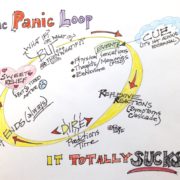There are many reasons why people engage in procrastination. Here’s my opinion of the top five, and how to get off dead center when you’re “in the stew.”

Procrastination: The Right Questions
1. Lack of clarity about the desired outcome. Whether it’s work or school, when people are confused by a project or assignment, or don’t know exactly what is expected of them, they often put it off in hopes that they will understand it better later. This is especially problematic for students who are uncomfortable with uncertainty—the purest form of anxiety, resulting in procrastination. Unfortunately, when they look at it the night before the deadline, they usually have no more information than they did before and no time left to ask their teacher for clarification. The question to answer is: “What will have changed between now and when you decide to start?”
2. Optimistic time estimates. Optimism is a wonderful quality…in most situations. But when it comes to estimating how much time it will take to complete an assignment, optimistic time estimates can create big problems. Students commonly overestimate the amount of time they have left to complete assignments, and underestimate the amount of time it will take to complete them. Consequently, they fail to leave themselves enough time to complete the work.The question to answer is: “What are the consequences of missing my deadline, and are they worth it?”
3. Overwhelmed Feelings. This reason is often a direct result of #1 and #2. When an assignment seems very complex or time-consuming, just thinking about it may be stressful. So people put it off. Here comes procrastination, our #1 avoidance “skill.” Unfortunately, this ultimately backfires when they eventually do start the project…because now the inherent difficulty of the project is compounded by the fact that they have insufficient time to complete it. So, they end up with far MORE stress than they would have had if they had started earlier. The question to answer is: “In the past, when you have worried a great deal about a future event, was the outcome as bad as your anticipatory anxiety?” [Hint: This almost never is the case.]
4. Not knowing where to start. When students think of papers or projects as a whole, rather than as a series of steps, they can seem overwhelming and they don’t know where to begin. So, they end up putting the whole project off, until it’s so close to the deadline that their worry about not knowing the “right” place to start is overshadowed by their fear of not having enough time to complete the work at all. The question to answer is “What are the necessary steps to take, and what is the best order to do them in?” [You need to make a list.]
5. Perfectionism / Fear of failure. Students preoccupied with making their projects “perfect”, nervous about making mistakes or “messing them up”, or afraid of criticism, are often so concerned about doing assignments incorrectly that they will put them off to avoid the anxiety they feel when they are trying to work on the project. Alternatively, they may spend too much time due to their anxious uncertainty on that same project trying to reach perfection. This can lead to the irrational behavior of avoiding the project even more as the deadline approaches (because they become less and less likely to be able to do a good job on it)…until, at last, they are so close to the deadline that producing an ideal assignment is no longer possible, and their only options are to do an imperfect job or turn in nothing at all. The question to answer is “Am I setting myself up for failure by predicting it into a self-fulfilling prophecy with self-talk so negative that I wouldn’t say these things to my worst enemy?” [Also, have I answered questions 1-4?]
If you cannot figure out the path forward due to a too-big pile, shoot me an email or go to my contact page. I am here and in your neighborhood, ready to help
Page Rutledge, LCSW, MSW, MPH is a Licensed Clinical Social Worker practicing in Wilmington, NC. She specializes in anxiety management and relationship repair. Visit her website and blog at www.pagerutledge.com










